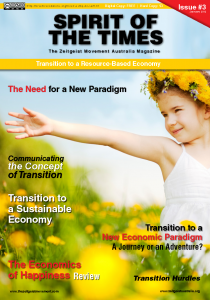Proposed Transition Steps to a Resource Based Economy.
By Mark Rogers, South Australia, Australia
Brief Overview
A Resource Based Economies (RBE) main goal is to use the resources of the planet, in sustainable ways, to raise the standard of living for all humanity, to help restore the biosphere to one that sustains not just the human population, but the remaining flora and fauna for generations to come.
Let’s look at some core challenges facing humanity today :
- ‘Shortages’ and Equitable Distribution of Food.
- Shortages and Equitable Distribution of Fresh Water.
- Shortages and Equitable Distribution of Energy (Electrical/Oil).
- Oil Production now constant, with rising demand, driving prices up and stalling national and world economies.
- Rising Unemployment due to Automation reducing people spending ability and ultimately their ability to survive.
- The Decline of the Global Monetary System: As Debt Mechanisms and Consumer Cycles destabilise, sometimes in dramatic ways with unforeseen results.
- Development and Failure to Roll Out of Third Generation Renewable Technologies to minimise our reliance on oil/coal for energy.
- Equitable Distribution of Safe and Healthy environments of second and third world states.
- Corporate ‘Ownership’ of Genetic ‘patents’ & GM Foods that benefit only the corporation.
- The Increasing Extermination Rate of global flora and fauna.
- Green House Gases accelerating Global Warming.
- The increasing amount of waste produced as a by-product of the Monetary System.
- The destruction of the Biosphere, which humanity needs to survive.
- Increased Population and population growth exasperating all of the above.
- Increased wars and confrontations to forcefully take what is needed to survive.
- The lack of political willpower, backed with long term vision and resources, to tackle all of the above.
One way or another we are all approaching a time of dramatic change. If we are to have any chance of surviving we need to examine what is failing us today and investigate what solutions we may have, even though if at first glance appear to be radical ideas. With this in mind I propose that a realistic look, research and evaluation of the RBE is highly advised as a way of tackling all of the above, not just for survival, but elevation of the whole human race and the world we inhabit.
Info can be found here : http://www.thezeitgeistmovement.com
and at: http://www.thevenusproject.com
Ok, so now you have watched tens of hours of video, a couple hundred pages of text and hopefully come to a few Zeitgeist movement meetings in your local area. That puts us at a similar level of understanding.
At this stage often one of the first questions is “what can I do to help?“
Well the most important thing we can do at this stage is raise awareness of a RBE, The Zeitgeist Movement, and The Venus Project. So simply talking to friends, family, acquaintances definitely helps. Even showing them Zeitgeist Moving Forward etc. should be even more informative to those interested.
Read more

